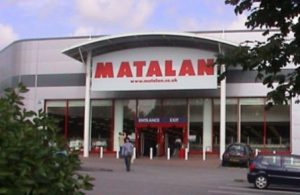Could Manchester be about to lose another major department store?

Manchester could be about to lose another department store with the deepening crisis on the high street showing no sign of easing.
According to reports this morning Debenhams is considering closing more than 50 stores as it struggles to balance its books.
The news has come just days after it was revealed that Mike Ashley – the new owner of House of Fraser – is closing its store in Manchester.
Kendals, as it was known, and Debenhams have long been the mainstays of Manchester’s city centre retail offer.
The store on Deansgate is one of the key shopping destinations in the North West and the decision to close it is being taken as a sign of the upheaval on the High Street.
Debenhams have a number of key stores in the region and including one on Market Street in Manchester city centre and at Liverpool One.
Financial advisers KPMG has been working with Debenhams on a rescue package.
The firm has already issued three profit warnings this year and even more bad news is expected on Thursday.
The chain had previously announced plans to cut 90 jobs at its head office and close 10 stores.
According to reports this morning another 50 could be added to the list by the end of the week.
Debenhams is looking to save up to £70m by negotiating rents with landlords and closing stores. The firm’s annual results are due to be published this Thursday.
There is also talk of a company voluntary arrangement – which allows a struggling insolvent business to keep trading while it draws up a plan to pay off its debts.
Richard Lim of Retail Economics said: “The fact KPMG has been brought in does not surprise me. Debenhams will be wanting to look at all the options open to them.
“The harsh reality is that they are operating in one of the most challenging parts of retailing at the moment.
“Consumers are increasingly shopping online, and they are also spending more on things like holidays and the experience economy.
“The other part of the pincer movement Debenhams is facing is that they are being squeezed on costs, with things like increasing rents and business rates, and rising wage and utilities bills.
“It all means that department stores are incredibly expensive to operate.”
The chain has lost more than 90 per cent of its market value since 2006, when it was relisted on the London Stock Exchange after being taken private in 2003
Debenhams shares dropped more than 17 per cent in morning trading and the firm issued an emergency statement.
It has said it expects full-year pre-tax profits of around £33m.
Chief executive Sergio Bucher said: “The market environment remains challenging and underlying trends deteriorated through the summer months.
“Nevertheless the product and format improvements we have tested are gaining traction and we are ready to scale up some of our strategic activity ahead of peak.
“Having put in place a leaner operational structure and strong leadership team, and taken action to strengthen our financial position, we are well equipped to navigate these market conditions and take advantage of any trading opportunities that emerge.”
Richard Stables, chief executive of Kelkoo, said: “Debenhams’ woes are another indication of how high street retailers are struggling to survive in an increasingly competitive retail landscape. Maintaining a portfolio of dozens of under-performing or loss-making stores is simply no longer a viable option as consumers increasingly value customer experience and better value.
“However, shareholders will be buoyed by the news of strong online growth suggesting that the retailer faces a brighter future if this continues.”







